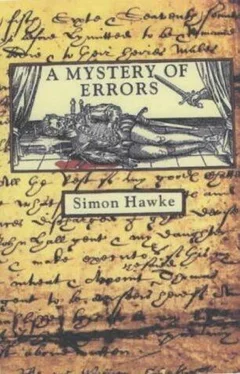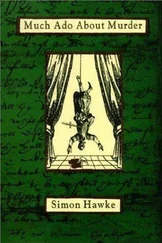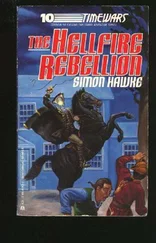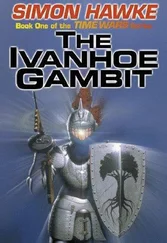Simon Hawke - A Mystery Of Errors
Здесь есть возможность читать онлайн «Simon Hawke - A Mystery Of Errors» весь текст электронной книги совершенно бесплатно (целиком полную версию без сокращений). В некоторых случаях можно слушать аудио, скачать через торрент в формате fb2 и присутствует краткое содержание. Жанр: Исторический детектив, на английском языке. Описание произведения, (предисловие) а так же отзывы посетителей доступны на портале библиотеки ЛибКат.
- Название:A Mystery Of Errors
- Автор:
- Жанр:
- Год:неизвестен
- ISBN:нет данных
- Рейтинг книги:3 / 5. Голосов: 1
-
Избранное:Добавить в избранное
- Отзывы:
-
Ваша оценка:
- 60
- 1
- 2
- 3
- 4
- 5
A Mystery Of Errors: краткое содержание, описание и аннотация
Предлагаем к чтению аннотацию, описание, краткое содержание или предисловие (зависит от того, что написал сам автор книги «A Mystery Of Errors»). Если вы не нашли необходимую информацию о книге — напишите в комментариях, мы постараемся отыскать её.
A Mystery Of Errors — читать онлайн бесплатно полную книгу (весь текст) целиком
Ниже представлен текст книги, разбитый по страницам. Система сохранения места последней прочитанной страницы, позволяет с удобством читать онлайн бесплатно книгу «A Mystery Of Errors», без необходимости каждый раз заново искать на чём Вы остановились. Поставьте закладку, и сможете в любой момент перейти на страницу, на которой закончили чтение.
Интервал:
Закладка:
“Have you taken him into your confidence, as well?”
“Marlowe? Perish the thought! He, unlike you, is dangerous. He is the most rash, impetuous, demented young fool that I have ever met, for all his brilliance.”
“I should not think that he would be any more capable of being a threat to you than I could,” Smythe said.
“On his own, perhaps not,” Worley replied, “but Marlowe has some secret friends. Powerful friends. And he does not even realize how powerful and unscrupulous they are, more’s the pity. More wine?”
“Uh… Aye. Please.”
“Help yourself. Oh, hell, bring the whole decanter over. Are you hungry?”
“I could eat, milord.”
“I have some of the queen’s own venison being prepared. There is plenty. You shall stay for supper.”
“You are most kind, milord. But you were speaking of Master Marlowe and his secret friends? Why secret?”
“Because they deal in secret things,” said Worley. “Among them, murder.”
“Murder?”
“Aye. Murder and intrigue. And at the highest levels.” “The highest levels of what, milord?”
“Of government, my lad, of government. Marlowe is a spy, the wretched soul.”
“A spy! “
“Aye, he allowed himself to get drawn into it while he was pursuing his studies at Cambridge. A nasty, complicated business. Papist versus Protestant, Rome versus England, with dashing young Kit Marlowe all caught up in it and playing both ends against the middle.”
“He told you all this?”
“Nay, I have other sources. Astonishingly enough, Marlowe can keep his mouth shut about some things. To a point, anyway. But he is irrepressible and, as his patron, I have been duly ‘cautioned.’ As an intimate of the queen, you see, I do receive some consideration. Especially since my ships have been so instrumental in helping line the pockets of the Privy Council. But enough about Marlowe. Believe me, the less you know about his intrigues, the better. You wanted to know why I am telling you all this, why I should take you into my confidence.”
“Aye, milord. It seems… rather unusual. I mean, you do not know me, really. True, ‘tis most unlikely that anyone in his right mind would take my word about anything over yours, but nevertheless, there is still the possibility that I might compromise you- or Master Marlowe-in some way. That is to say, I assure you that I would not, at least not intentionally, but how do you know that I would not?”
Worley chuckled. “Because you say such things, that is how I know. And because I do not know as little about you as you think. I have made inquiries. I know all about your father and his recent difficulties, for one thing, and I know about your uncle, for another. I was most especially interested in him, considering your claim that you could craft a sword superior to the one I loaned you. Was it merely arrogant boastfulness or simple honesty? As your uncle was the man who taught you, I was keen to learn what sort of work he did. Now, I believe you.” Worley reached down to his side and drew a dagger from a sheath at his belt. He placed it on the table and slid it across to Smythe. “You will recognize the workmanship, of course, even without your uncle’s maker’s mark on the ricasso. The craftsmanship is among the best that I have ever seen.”
Smythe picked up the dagger, already knowing it to be his uncle’s work. He swallowed nervously. “I take your point, Sir William.”
“I think you miss it,” Worley replied, seeing the expression on his face. “I am not threatening your family, Smythe. I could, of course, but that was not my purpose. I wanted to find out more about you. That day on the road, I saw something in you that I do not see in men very often. I saw a remarkable forthrightness, and a complete lack of fear. Those are very admirable qualities. Admirable and rare. And they should be encouraged.”
“I am not fearless, Sir William,” Smythe said. “In all honesty, I was a bit afraid to come here.”
Worley shook his head. “I do not believe you were, else you would not have come. I have no doubt you felt some apprehension, some uncertainty, to be sure… but fear? You are not the sort. You do not seem to have it in you. I sat astride my stallion with a pistol aimed straight at your chest and you did not blink an eye. You exercised the proper caution that the situation called for, yet you kept your head and even bantered with me. I admired that in you. It reminded me… of me. And you know, as enjoy-ably diverting as it may be to be Black Billy, the infamous highwayman that every schoolboy sings about, a large part of that joy is lost in not having anyone to tell about it. Well… now I have you.” He smiled. “So, what say we take a quick look at that forge I promised you before sitting down to supper? You still owe me a sword, you know.”
The play, thought Shakespeare, was appallingly inept. Its failure to draw a decent audience at the Theatre was not due to any particular failing of the actors, although from what he’d seen, the only really good performer in the company was Ned Alleyn, and he had just quit. Things were not looking very promising for the Queen’s Men, but despite any flaws in the company’s performance, the main fault lay in the play itself.
Part of the problem was that it was not a new play, but one that had been adapted from other sources and rewritten many times, so that he no longer had any idea who the original author was or precisely what had been intended. This particular version was credited to Greene, and it had his stamp all over it. The Honorable Gentleman was full of literary references and high-flown academic speech which suffered from the same pretensions that it aimed to satirize, and in those cases where these allusions did not go straight over the heads of most people in the audience, they were explained awkwardly by other characters, who were simply leaden in their coarseness and derision.
The honorable gentleman of the title was a prosperous merchant of the rising middle class, with pretensions to gentility, and throughout the play, he was held up as an object of cruel mockery and ridicule. His employees stole from him, his suppliers cheated him, his wife cuckolded him, and throughout, the main character remained blissfully unaware and foolishly convinced of his own genteel superiority. It was, thought Shakespeare bleakly, crass pandering to the groundlings and as unoriginal as sin.
The speeches were all grandiose and peppered with crude jokes, which seemed to be there for no other purpose than to break up the monotony of the declamation by allowing some character or other to play the fool and caper for the audience. At some point, perhaps, there was a cohesive story that somehow got lost along the way as a result of too many cooks pissing in the stew. And now, he was going to piss in it, as well. He was not at all convinced that his efforts would improve the flavor, either. Still, he had to try.
He had been up all night, working on it. At first, he had thought that he could simply polish a bit here and improve a little there, and tighten some things up a little overall, but it soon became apparent that nothing less than a complete rewrite would do. And that would not save the next performance, because there would simply be no time in which the members of the company could learn all their new lines. The task seemed utterly impossible, especially given the time constraints he had to work under. Had he begun from scratch, with a completely new, original play, it would have been much easier, but that was not what he had been asked to do. His job was to rescue this one. The trouble was, he could not generate any enthusiasm for the project, because he simply hated it.
Nevertheless, this was going to be his chance to show what he could do, and if he failed to deliver something much improved, he had little doubt that there would ever be another opportunity to prove himself, at least to this company. Somehow, before he could even entertain the notion of submitting his own plays for consideration, he had to make a start and convince them that he knew his business, that he could turn a phrase adroitly.
Читать дальшеИнтервал:
Закладка:
Похожие книги на «A Mystery Of Errors»
Представляем Вашему вниманию похожие книги на «A Mystery Of Errors» списком для выбора. Мы отобрали схожую по названию и смыслу литературу в надежде предоставить читателям больше вариантов отыскать новые, интересные, ещё непрочитанные произведения.
Обсуждение, отзывы о книге «A Mystery Of Errors» и просто собственные мнения читателей. Оставьте ваши комментарии, напишите, что Вы думаете о произведении, его смысле или главных героях. Укажите что конкретно понравилось, а что нет, и почему Вы так считаете.












